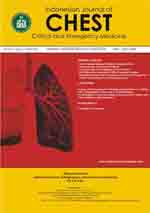
Predictor Factors for 30-Day Mortality in Adult Hospitalized CAP with Immunosuppressive-Dose Glucocorticoid Use
Dwitya Wilasarti1, Mira Yulianti2, Suzy Maria3, Robert Sinto4, Adityo Susilo4, Dicky L. Tahapary5, Dono Antono6, Pringgodigdo Nugroho7
1. Department of Internal Medicine, Faculty of Medicine Universitas Indonesia – Dr. Cipto Mangunkusumo General Hospital
2. Division of Respirology and Medical Critical Illness, Department of Internal Medicine, Faculty of Medicine Universitas Indonesia –
Dr. Cipto Mangunkusumo General Hospital
3. Division of Allergy and Immunology, Department of Internal Medicine, Faculty of Medicine Universitas Indonesia –
Dr. Cipto Mangunkusumo General Hospital
4. Division of Infectious and Tropical Diseases, Department of Internal Medicine, Faculty of Medicine Universitas Indonesia –
Dr. Cipto Mangunkusumo General Hospital
5. Division of Endocrinology, Metabolic, and Diabetes, Department of Internal Medicine, Faculty of Medicine Universitas Indonesia –
Dr. Cipto Mangunkusumo General Hospital
6. Division of Cardiology, Department of Internal Medicine, Faculty of Medicine Universitas Indonesia –
Dr. Cipto Mangunkusumo General Hospital
7. Division of Nephrology and Hypertension, Department of Internal Medicine, Faculty of Medicine Universitas Indonesia –
Dr. Cipto Mangunkusumo General Hospital
Abstract
Background: Glucocorticoids are still frequently used for various conditions such as autoimmune diseases and malignancies, leading to immunosuppression and risk of pneumonia. Pneumonia in the immunocompromised host have a higher mortality rate compared to the immunocompetent population. The clinical manifestations of pneumonia in this population are often atypical, and clinical conditions can deteriorate rapidly compared to the time of admission, making predictors at admission necessary to assess risk mortality.
Objective: To evaluate the PSI score, lymphocyte count, increase in procalcitonin levels, history of chemotherapy, history of other immunosuppressant use, and the presence of comorbid lung disease as predictors of 30-day mortality in hospital-acquired community pneumonia patients using immunosuppressive doses of glucocorticoids.
Method: This study is a retrospective cohort study of subjects diagnosed with community-acquired pneumonia who were treated at RSUPN Dr. Cipto Mangunkusumo with a history of immunosuppressive dose glucocorticoid use. Bivariate analysis was conducted, followed by multivariate analysis of the predictor factors for 30-day mortality.
Results: Among the 267 study subjects, significant predictor factors were found, including a PSI score > 91 (RR 1.873; 95% CI 1.383 – 2.535) with a p-value < 0.001, and increased procalcitonin levels (RR 1.386; 95% CI 1.080 – 1.780) with a p-value of 0.01.
Conclusion: A PSI score > 91 and procalcitonin > 0.76 ng/dl are predictors of 30-day mortality in community-acquired pneumonia patients with a history of immunosuppressive doses of glucocorticoids treated at RSUPN Dr. Cipto Mangunkusumo.
Keywords: immunocompromised host pneumonia, glucocorticoids, 30-day mortality



